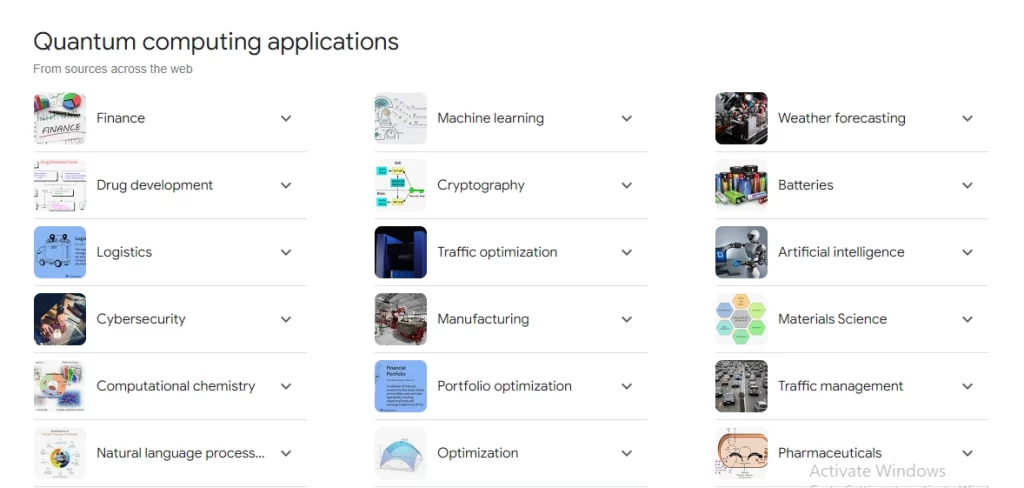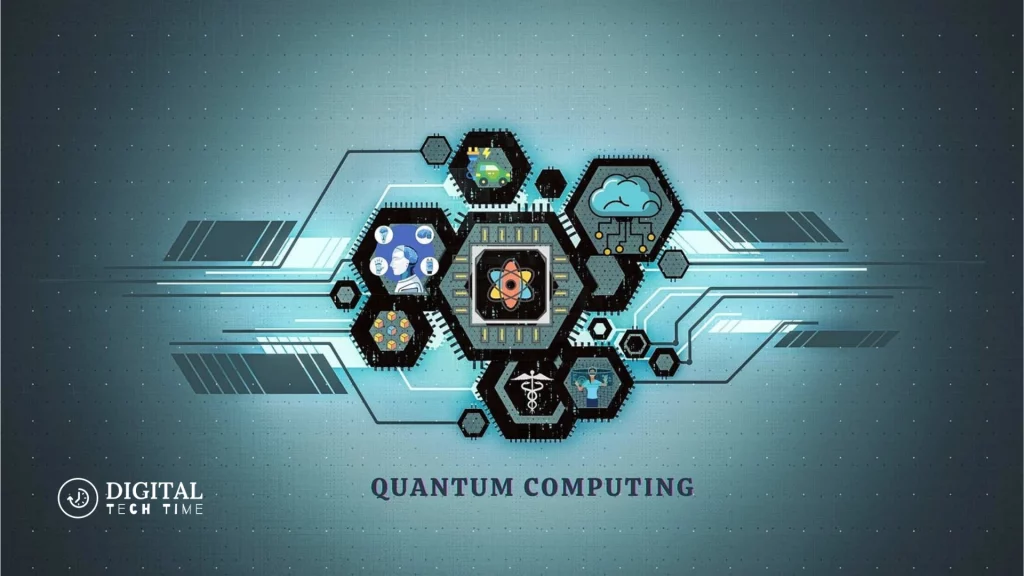5 Crucial Quantum Computing Applications & Examples
Welcome to the fascinating realm of quantum computing, a revolutionary technology that promises to reshape how we tackle complex problems and unlock new frontiers of innovation. As we delve into this captivating field, we embark on a journey that challenges our traditional understanding of computing and introduces us to a world governed by the counterintuitive laws of quantum mechanics.
In this comprehensive article, we will explore the incredible potential of quantum computing by examining five crucial applications that have the power to transform various industries and solve intricate challenges. From unraveling the mysteries of cryptography to accelerating drug discovery and optimizing complex systems, quantum computing offers a tantalizing glimpse into the future of computational power.
Table of Contents
Quantum Computing Applications in Cryptography

One of the most promising applications of quantum computing lies in cryptography, the practice of securing communication and data through encryption. Traditional cryptographic methods rely on the computational difficulty of factoring large numbers or solving complex mathematical problems, which are practically infeasible for classical computers.
However, quantum computers, with their ability to perform calculations on multiple states simultaneously, have the potential to break many of the encryption algorithms currently in use. This poses a significant challenge to sensitive data and communications security, as quantum computers could render current encryption methods obsolete.
Quantum Computing Applications in Drug Discovery

The pharmaceutical industry has long grappled with the time-consuming and resource-intensive drug discovery and development process. Quantum computing offers a promising solution to accelerate this process by simulating and modelling complex molecular interactions with unprecedented accuracy.
One of the critical applications of quantum computing in drug discovery is the simulation of protein folding and molecular docking. These processes are crucial for understanding how drugs interact with target proteins and identifying potential drug candidates. Classical computers need help to accurately model molecules’ intricate quantum mechanical behaviour, leading to approximations and limitations in the drug discovery process.
The Future of Quantum Computing Applications

As the field of quantum computing continues to evolve, the potential applications and use cases are expected to expand significantly. Here are some exciting possibilities for the future of quantum computing applications:
- Quantum Simulation: Quantum computers have the potential to accurately simulate complex quantum systems, such as materials, chemical reactions, and subatomic particles. This capability could lead to material science, energy research, and particle physics breakthroughs.
- Quantum Artificial Intelligence: By combining the power of quantum computing with advanced machine learning techniques, researchers aim to develop quantum artificial intelligence (QAI) systems that can tackle complex problems with unprecedented accuracy and efficiency.
- Quantum Internet and Communication: The development of a quantum internet, which leverages principles like quantum entanglement and quantum teleportation, could enable secure and ultra-fast communication networks resistant to hacking and eavesdropping.
- Quantum Sensing and Metrology: Quantum sensors and metrology devices could revolutionize various fields, including navigation, medical imaging, and environmental monitoring, by providing unprecedented precision and sensitivity.
- Quantum Computing in Space Exploration: Quantum computers could play a crucial role in space exploration by enabling more accurate simulations of celestial bodies, optimizing spacecraft trajectories, and processing vast amounts of data from space-based sensors and telescopes.
Challenges and Limitations of Quantum Computing
While quantum computing holds immense promise, it also faces challenges and limitations before it can be widely adopted and implemented. Here are some of the key challenges and limitations:
Quantum Decoherence: Quantum systems are susceptible to external disturbances, such as temperature fluctuations, electromagnetic fields, and even cosmic rays. These disturbances can cause the quantum state to collapse, a phenomenon known as decoherence, which can lead to calculation errors and compromise the reliability of quantum computers.
Quantum Error Correction: Quantum error correction techniques are required to mitigate the effects of decoherence and other sources of errors. However, developing robust and scalable error correction methods is a significant challenge, as it requires additional qubits and complex algorithms, further increasing the complexity of quantum computing systems.
Scalability and Qubit Quality: Building large-scale quantum computers with sufficient high-quality qubits is a formidable task. As the number of qubits increases, the complexity of controlling and maintaining their quantum states grows exponentially, posing significant engineering and manufacturing challenges.
Lack of Quantum Algorithms: While quantum computers offer significant advantages for specific problems, developing practical and efficient quantum algorithms is still in its infancy. Researchers are actively developing new algorithms that can leverage the full potential of quantum computing, but this remains a significant challenge.
Technological Barriers: Quantum computing requires specialized hardware and infrastructure, such as cryogenic cooling systems and advanced control electronics. Developing and manufacturing these components at a large scale and with the necessary precision is a significant technological challenge.
Despite these challenges, the potential benefits of quantum computing continue to drive research and development efforts worldwide. Overcoming these limitations will require interdisciplinary collaboration among physicists, computer scientists, engineers, and mathematicians and significant investment in research and infrastructure.
Real-World Examples of Quantum Computing Applications

While quantum computing is still in its early stages, several real-world examples already showcase this revolutionary technology’s potential. Here are a few notable examples:
- Quantum Computing for Financial Portfolio Optimization: Companies like Goldman Sachs and JPMorgan Chase have explored quantum computing for portfolio optimization and risk management. By leveraging quantum algorithms, they aim to identify optimal investment strategies and manage risk more effectively.
- Quantum Computing for Drug Discovery: Pharmaceutical companies like Biogen and Boehringer Ingelheim have partnered with quantum computing companies to accelerate drug discovery processes. They hope to identify promising drug candidates more efficiently by simulating complex molecular interactions and protein folding.
- Quantum Computing for Logistics and Supply Chain Optimization: Companies like Volkswagen and Airbus have been investigating the use of quantum computing to optimize their supply chain and logistics operations. They aim to reduce costs and improve efficiency by modelling complex transportation networks and schedules.
- Quantum Computing for Cybersecurity: Organizations like the National Security Agency (NSA) and the Canadian government have explored quantum computing for cybersecurity applications, such as quantum-resistant cryptography and secure communication protocols.
- Quantum Computing for Climate Modeling: Research institutions like the Oak Ridge National Laboratory and the University of Chicago have used quantum computing to model and simulate complex climate systems. By leveraging the computational power of quantum computers, they aim to improve the accuracy of climate predictions and better understand the impact of climate change.
Related Post: The Role of Coding in Cybersecurity Careers
Frequently Asked Questions
What is quantum computing?
Quantum computing is a rapidly evolving field that harnesses the principles of quantum mechanics to perform computations and solve problems intractable for classical computers.
How is quantum computing different from classical computing?
Unlike classical computers that use bits (0 or 1), quantum computers use quantum bits (qubits) that can exist in a superposition of both 0 and 1 simultaneously. This allows quantum computers to perform calculations on multiple states concurrently, enabling them to solve specific problems exponentially faster than classical computers.
What are the critical applications of quantum computing?
Some critical applications of quantum computing include cryptography, drug discovery, optimization problems, machine learning, and simulations of complex quantum systems.
Are there any real-world examples of quantum computing applications?
Several real-world examples of quantum computing applications include financial portfolio optimization, drug discovery, logistics and supply chain optimization, cybersecurity, and climate modelling.
What are the challenges and limitations of quantum computing?
Some significant challenges and limitations of quantum computing include quantum decoherence, quantum error correction, scalability and qubit quality, lack of practical quantum algorithms, and technological barriers related to specialized hardware and infrastructure.
Conclusion
As we conclude our exploration of the crucial quantum computing applications and examples, it is evident that this revolutionary technology holds immense potential to transform various industries and solve complex problems that were once considered intractable. From enhancing cryptographic security, accelerating drug discovery, optimizing complex systems, and revolutionizing machine learning, quantum computing promises to unlock new frontiers of innovation and computational power.







